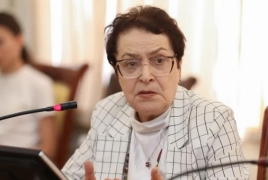
Larisa Alaverdyan, Armenia’s former Human Rights Defender, stated in a media interview at Liberty Square that displaced residents from Artsakh should be provided with social housing.
“The housing issue—typically addressed as a mid-term priority in any country—has only one solution, and it has proven effective over time,” Alaverdyan told journalists, as reported by Panorama.am .
She emphasized that offering social housing to displaced Artsakh residents would resolve several key issues, including those related to national identity and cultural preservation.
“These residences could also create jobs, just like in Artsakh. So where should Armenia find the funds? There were budget allocations set aside for 2023–2025 under mid-term programs. Those funds should be redirected to this cause, yet the initiative was rejected,” she said.
Alaverdyan noted that the concept of social housing construction had already been proposed in the late 1990s when Armenia had received over 340,000 refugees. “Back then, the government managed to solve the issue to some extent. At one point, social housing was built and even granted to refugees as private property, despite them having lived in dire conditions without legal status for over 10–15 years,” she explained.
She argued that Armenia is not wealthy enough to rely solely on private home ownership.
“This also applies to our homeless compatriots in Armenia. Why? Because the state is the poorest entity in this scenario. We proposed that housing be acquired and owned at the state or local municipal level and then made available to Artsakh residents on a use-rights basis. It’s a political matter. The displaced know they’re not here to settle permanently, but they still have a roof over their heads and can live with dignity while continuing to fight for their return. That is the main objective—return. They live in these homes the same way we once did during the Soviet era,” Alaverdyan concluded.
The cancellation of the “40,000+10,000 AMD” assistance program for Artsakh refugees, effective April 1, has sparked outrage among the displaced population, many of whom fear it could accelerate emigration.

